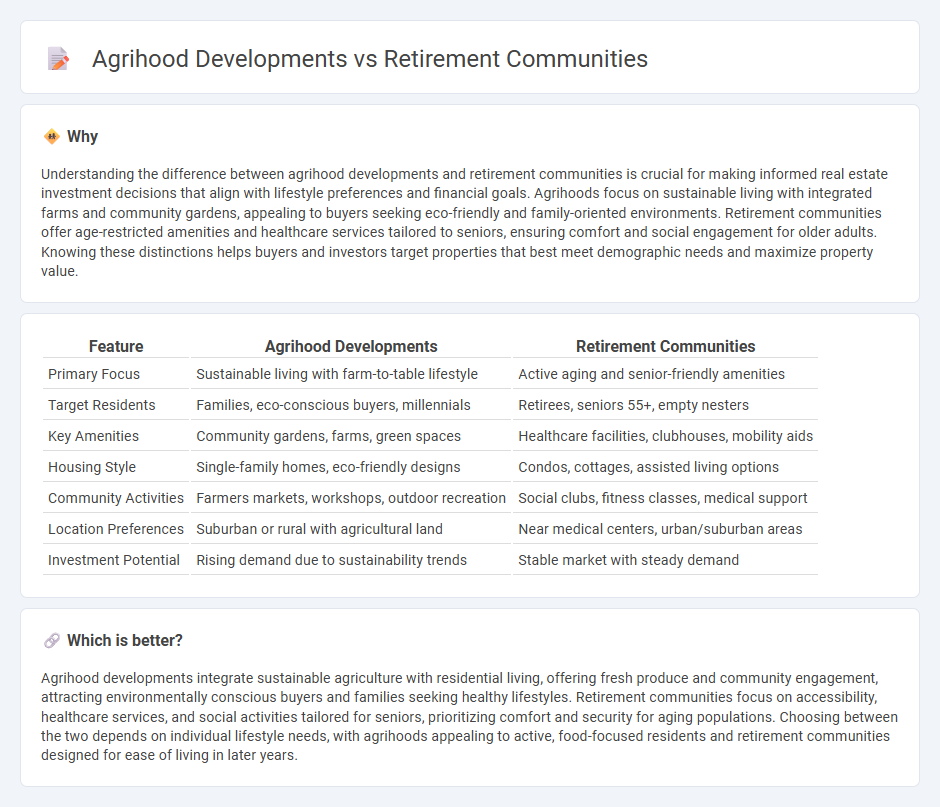
Agrihood developments integrate sustainable farming and residential living, offering fresh produce and green spaces that promote a healthy lifestyle. Retirement communities focus on accessibility, social engagement, and healthcare services tailored to older adults' needs. Discover the unique benefits of agrihoods compared to retirement communities to find the ideal living environment for your future.
Why it is important
Understanding the difference between agrihood developments and retirement communities is crucial for making informed real estate investment decisions that align with lifestyle preferences and financial goals. Agrihoods focus on sustainable living with integrated farms and community gardens, appealing to buyers seeking eco-friendly and family-oriented environments. Retirement communities offer age-restricted amenities and healthcare services tailored to seniors, ensuring comfort and social engagement for older adults. Knowing these distinctions helps buyers and investors target properties that best meet demographic needs and maximize property value.
Comparison Table
| Feature | Agrihood Developments | Retirement Communities |
|---|---|---|
| Primary Focus | Sustainable living with farm-to-table lifestyle | Active aging and senior-friendly amenities |
| Target Residents | Families, eco-conscious buyers, millennials | Retirees, seniors 55+, empty nesters |
| Key Amenities | Community gardens, farms, green spaces | Healthcare facilities, clubhouses, mobility aids |
| Housing Style | Single-family homes, eco-friendly designs | Condos, cottages, assisted living options |
| Community Activities | Farmers markets, workshops, outdoor recreation | Social clubs, fitness classes, medical support |
| Location Preferences | Suburban or rural with agricultural land | Near medical centers, urban/suburban areas |
| Investment Potential | Rising demand due to sustainability trends | Stable market with steady demand |
Which is better?
Agrihood developments integrate sustainable agriculture with residential living, offering fresh produce and community engagement, attracting environmentally conscious buyers and families seeking healthy lifestyles. Retirement communities focus on accessibility, healthcare services, and social activities tailored for seniors, prioritizing comfort and security for aging populations. Choosing between the two depends on individual lifestyle needs, with agrihoods appealing to active, food-focused residents and retirement communities designed for ease of living in later years.
Connection
Agrihood developments and retirement communities both emphasize sustainable living and access to green spaces, promoting well-being among residents. These communities integrate agriculture-based amenities like community gardens and farmers' markets, appealing to retirees seeking an active lifestyle and fresh, local produce. The intersection of these two housing models reflects a growing trend toward environmentally conscious, health-oriented residential planning.
Key Terms
Age-Restricted Zoning
Age-restricted zoning plays a crucial role in both retirement communities and agrihood developments, ensuring residents meet specific age criteria, typically 55 and older, to foster environments tailored to mature adults. Retirement communities prioritize amenities and services catering to seniors' health, leisure, and social needs, while agrihoods integrate sustainable agriculture and community engagement alongside age restrictions to promote active lifestyles. Explore how zoning laws impact your lifestyle and investment opportunities in these unique neighborhoods.
Farm-to-Table Amenities
Retirement communities prioritize comfort and accessibility, often featuring farm-to-table amenities such as on-site gardens and locally sourced meals to promote healthy, sustainable living for seniors. Agrihood developments integrate residential living with active farming, offering residents direct access to fresh produce, cooking classes, and community farming activities that emphasize sustainability and wellness. Discover how these innovative living models prioritize farm-to-table experiences to enhance lifestyle quality.
Community Engagement
Retirement communities prioritize fostering strong social connections through organized activities, wellness programs, and shared amenities tailored for older adults, promoting a supportive and interactive environment. Agrihood developments center community engagement around sustainable agriculture, encouraging residents to participate in farming, gardening, and local food events that enhance social ties and environmental stewardship. Explore how these distinct approaches cultivate vibrant, connected neighborhoods by learning more about their community engagement strategies.
Source and External Links
Retirement community - Wikipedia - A retirement community is a residential community designed for older adults who are generally able to care for themselves, often featuring age restrictions, shared amenities, and various housing options from independent living to assisted care.
Retirement Communities | Senior Retirement Homes & 50 Plus - Retirement communities cater to seniors with different needs, offering options like assisted living (with care services), independent living (for active seniors), age-restricted communities (typically 55+), and lifestyle communities focused on amenities and activities.
55places: Search 55+ Community Retirement Homes for Sale - 55+ communities are age-restricted, active adult neighborhoods offering a maintenance-free lifestyle with homes and amenities specifically for residents aged 55 and older.
 dowidth.com
dowidth.com